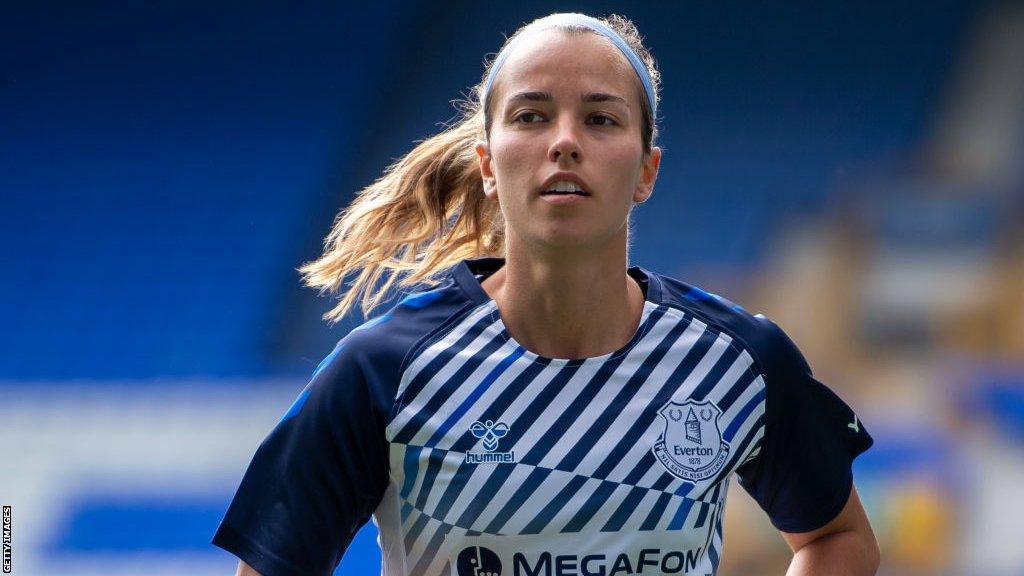Rikke Sevecke: Ex-Everton defender on the heart condition that ended her career, women's health and playing at Anfield
- Published

Rikke Sevecke was forced to retire at the age of 27
Rikke Sevecke was alone in her new apartment in Oregon when she got the phone call that would change her life.
The Everton defender had just swapped Merseyside for the west coast of the United States to join National Women's Super League (NWSL) side Portland Thorns.
But Sevecke would leave Portland having never played a single minute for the Thorns after doctors detected a heart condition during her medical and advised her to retire immediately.
The cruel irony of the situation is not lost on Sevecke. At 27, she felt it was time to pursue her life-long dream of playing in the US but it was the medical examinations involved in her move that uncovered a heart condition called arrhythmogenic right ventricular cardiomyopathy (ARVC).
"It's why I have a lot of mixed feelings," Sevecke told BBC's World Service Sportshour programme.
"I'm happy they found it, because now I know. But I'm also really sad that I couldn't continue doing what I loved."
Sevecke had just earned her 54th and final cap for Denmark when she received the news. Though her initial medical with the Thorns had detected concerning signs, national team doctors gave her permission to play in the 2023 World Cup in Australia and New Zealand, where Denmark were knocked out in the last-16.
"I decided that summer that I wanted to transfer to another club and in the medical they discovered something a little bit alarming," said Sevecke.
"They told me that what they saw was OK, but they would like to monitor me and have a closer look after the World Cup.
"So I went back after the World Cup and they'd told me I could play and I shouldn't be worried or anything. But when I came back and they checked me again, it looked a little bit worse than before.
"They wanted to do extra tests but in the meantime I could still play, so I signed for Portland. They called me while I was there getting ready to train and told me to stop immediately."
Until then, Sevecke's career had run smoothly and she earned a move to Everton - where she spent three years - in 2020 after starting with Brondby in her homeland.
For Sevecke's Liverpool-supporting family, watching her Everton side leave Anfield with a 3-0 win in 2022 was a highlight of her time in England.
"My dad was in the stands and he's a Liverpool fan. He was almost crying when we walked onto the pitch, and when we won he had tears in his eyes. It was just really amazing to see how happy he was and how much it meant for him as well," she said.
Heart-related issues in men's football have been well-documented in recent years, with a number of high-profile players such as Sergio Aguero, Daley Blind and Iker Casillas suffering varying problems.
Tom Lockyer, the Luton Town captain, suffered a cardiac arrest during a Premier League game against Bournemouth in December that left the 29-year-old 'technically dead' for two minutes and forty seconds.
While the defender is yet to make a decision on whether to return, Christian Eriksen returned to football in 2022 eight months after a cardiac arrest of his own after fitting an Implantable Cardioverter Defibrillator (ICD).
Sevecke believes women's health in football is under-researched and has taken a role with Fifpro - the International Federation of Professional Footballers - to highlight the problem.
"It's really important to highlight that it can happen to anyone," Sevecke said.
"A lot of people will have something (wrong) with their hearts and not know it. I didn't know it and I've had it my whole life.
"It's kind of scary that I've been playing for 24 years and I've never known that I have something wrong with my heart that actually gets worse by playing football professionally.
"It's really important to try and change those health and safety checks, to have them more often, that they're more advanced and more thorough.
"If I hadn't moved clubs in the summer it might not have even been picked up."